- Home
- Georgette Heyer
Acting on Impulse Page 6
Acting on Impulse Read online
Page 6
“My good youth, are you seriously accusing Mr. Caryu? Even supposing that he is the man we’re after—which he isn’t—would he have copied the plans while they were in his house? He’s not a fool, you know.”
“Where was he during those three days?”
“At home. Winthrop went round to his house, and together they examined the plans. That was on the first day, and Winthrop left the house soon after nine in the evening. Shortly after he had gone Caryu put the plans into his safe. He had them with him next day at the War Office, and put them into the safe when he came home. Not even his secretary knew of their existence. They were returned to Tassel on the following afternoon.”
Linckes’ forehead wrinkled in perplexity. “When did Johnson see them?”
“Before. He worked with Tassel, you see.”
“Um! And where did Sir Charles Winthrop go when he left Caryu’s house that night?”
“He went straight down to his place in the country—Millbank. Took Max Lawson with him. He was there for the rest of the week, with a small house-party. That wipes him off the list.”
“What sort of a man is he?” Linckes asked. “All I know is that he’s fairly young, very clever, and good-looking, rich, and an orphan.”
“He’s an awfully decent chap. Everybody likes him. Son of old Mortimer Winthrop. the railwayman. Mortimer separated from his wife when Charles was a kid. You know Charles’ history. She went abroad with the other child, I believe, and Mortimer kept Charles. Did awfully well in the Secret Service during the war, and rose like a rocket. He’ll be a big man before long, if this awful business is cleared up. Of course, he feels pretty badly about it. Means he’ll perhaps have to resign his post.”
“Yes, I suppose so. What about Tassel?”
“Tassel’? My dear Linckes, if you’re going to shadow him I shall begin to regret I ever put you on to the case. Why, you might just as well suspect Caryu!”
“Ah!” said Linckes, and saw the chief’s lips twitch.
The telephone-bell rang sharply before Masters had time to speak again. He unhooked the receiver.
“Hallo! What? Sir Charles? Yes, put him through to me at once, will you?” He nodded at Linckes. "I thought Winthrop would ring up. I told him about you. Our White Hope. Yes? Hallo! Is that Sir Charles? Good-morning! Yes, he’s here now. Yes, I’ve told him all I know. No, I don’t think so. Well, he hasn’t had much chance to yet. What? Yes, certainly! Now? All right, Sir Charles, I’ll send him along. What? Oh, I see! Yes, all right. Good-bye!”
He put the receiver back.
“Sir Charles wants you to go along to his house now, Linckes—16, Arlington Street. Get along there as quickly as you can, will you? I want you to put every ounce of your brain into this. It’s a big chance for you, you know.”
Linckes rose, and drew a deep breath.
II.
HALF an hour later he stood in the library of No. 16, Arlington Street, taking in his surroundings with appreciative eyes. He was examining a fine old chest by the window when Winthrop came in.
Linckes turned. He beheld a tall, slim man of perhaps thirty-five years old, with an open, handsome face, in which sparkled a pair of dark eyes, singularly expressive, and fringed by long black lashes. Winthrop held Linckes’ card in his hand, and he came forward, smiling. The smile dispersed the slight sternness about his mouth, and left it boyish and charming. Very simply he told Linckes all that he knew, while the young detective listened intently, occasionally putting a question.
“And that’s all,” Winthrop ended ruefully. “’Tisn’t much to go on, is it?
“No; very little. You don’t suspect anyone yourself?”
“I don’t. I admit it looked like the work of an outsider, but I just don’t see how it can be. Masters first suspected Ruthven, my secretary; but that’s impossible. I can account for all his movements, and I know that he didn’t go near Caryu’s place during the three days that the plans were there, for the simple reason that he was with me at Millbank.”
“There might be an accomplice.”
Winthrop screwed up his nose, perplexed.
“Well, of course there might be. But, considering that Ruthven himself doesn’t know the key to the safe, I don’t see how that helps. Besides, Caryu has a most elaborate alarm thing in his safe-room. Only he and I know the workings to it. Either of us could enter the room without disturbing it, provided we did not try to get in at the window, or any funny trick like that, but no one else could. Whoever did it must have watched the place for months; might even have been in the household. Probably was, because there were no signs of burglary. We had no idea anything had been tampered with until we had ample proof that Russia had learnt the secret of those new subs. I tell you it’s absolutely incomprehensible!”
Linckes pulled out his cigarette-case, frowning. He started to tap a cigarette on it absent-mindedly.
“The servants have been accounted for I suppose?”
Winthrop’s white teeth gleamed in an infectious laugh.
“Oh lor’, yes! They’re all being watched and interrogated, and Heaven knows what besides. We don’t think they have anything to do with it. It’s too big a thing.”
“I may act as I think fit?” Linckes asked.
“Absolutely! Interview all the servants, or anyone else you like. I say, don’t smoke your own cigarette. Have one of mine.”
Linckes suddenly became aware of the cigarette in his hand.
“I beg your pardon!” he exclaimed. “I ought to have asked you if you minded smoking. Well, thanks very much!” He took a cigarette from the box Winthrop held out to him, and inspected it. “’Fraid I don’t usually indulge in this brand. I smoke gaspers as a general rule.”
He lit the cigarette, smiling.
“Do you? I only smoke these. Sometimes, but very rarely, a cigar.”
“Of course, I really prefer a pipe to anything,” Linckes remarked.
Winthrop shook his head. “Can’t rise to that. I think they’re ghastly things. Look here! Have I told you enough? I mean, ask me any question you like.”
“I think I’ve got enough to keep me occupied for a few days, thanks. I’ll be getting along now if you don’t mind.” He rose and held out his hand.
Winthrop jumped up.
“Right-ho! And try your damnedest, won’t you? We’re trying to keep a brave front. But—well, it’s serious. Just as serious as it can be. And until the mystery is solved Caryu and the rest of us are in a pretty sultry position. And —and it happens to mean rather a lot, to me especially, to have the thing cleared up.”
“You may be quite sure that I shall do my best,” Linckes told him. He gripped Winthrop’s hand, and as he did so the door opened.
“Charlie, it really is too bad of you!” chided an amused voice. “I suppose you’ve quite forgotten that you asked me to lunch with you at the Berkeley? I beg your pardon I’d no idea you were engaged. Daddy, he’s deep in business.”
“Well, you shouldn’t burst in on him in that unceremonious way,” answered Caryu. He came leisurely into the room and cast a quick glance at Linckes. “Sorry to intrude like this, Charles. Autonia’s fault!”
“How was I to know that he was engaged?” demanded Miss Caryu aggrievedly. She sauntered forward, bowing to Linckes.
“I’m not engaged, I’m sorry to say,” retorted Winthrop. “I hadn’t forgotten, Tony, honestly. I was detained, but I was just coming. Caryu, may I introduce Mr. Linckes?”
Linckes found himself the object of a keen scrutiny.
“Very pleased to meet you!” said Caryu, and shook hands. “You’re not Tom Linckes’ son, by any chance?”
“Yes, I am, sir. Do you know him?”
“Very well. We were at college together. Hope you’ll be able to help us in this business.”
Tony, who had just seated herself on the table, looked up. “Oh, are you the new detective, Mr. Linckes?” she asked interestedly.
“Autonia!”
“Well, all
right, Daddy. You can’t help my knowing. How do you do?”
She extended a small gloved hand to Linckes, who took it, and stammered something that seemed to him inane.
“I hope you’ll solve the mystery,” Tony said. “You don’t look frightfully Sherlock Holmes-y, you know!”
She smiled mischievously. It was then that Linckes’ heart changed hands.
Then he took his leave of them and went out, all thoughts obscured for the moment by the picture of Miss Autonia Caryu sitting on a table with her slim ankles crossed, and a friendly smile on her beautiful red lips.
III.
NEARLY three months slipped by, and found Linckes disgruntled. Caryu had been very kind to him. So, too, had Caryu’s daughter.
He was a little puzzled by Winthrop. He had been drawn to him from the very first, but he was at a loss to understand his moods. One day Sir Charles would be flippant and gay, the next irritable and restless; he was sometimes most inconsequent and absent-minded. Yet with all this nervous temperament he was undoubtedly clever, always charming, and an eminently responsible person. Once Linckes spoke tentatively to Tony about him, and the girl had laughed.
“Oh, Charlie’s an extraordinary man!” she had said. “A perfect darling, but quite mad! They think an awful lot of him at the War House, you know. Under that flippant manner of his there’s heaps and heaps of brain. Everybody loves him, but he’s a dreadful trial!”
“A trial?” had asked Linckes. “Why?”
“Well, he’s so — so moody. And he will forget things. Sometimes he’ll say a thing to me and contradict it within an hour. When I tease him about it, he just laughs and says, ‘Oh, did I? That was just hot air, then.’ It’s a pose, I think. He used not to do it so much.”
Linckes’ eyes narrowed.
“Funny! Doesn’t seem quite to fit in with his reputation, somehow.”
“That’s why I say it’s a pose,” Tony had answered triumphantly. “’Cos really he’s a most capable person. Daddy says he’s got a huge grip on affairs. And—and now this beastly traitor business has cropped up, and if you can’t solve the mystery it means Charlie and Daddy’ll be under a sort of cloud, and it’s—it’s such a shame! I mean, everyone who knows Charlie knows that he’s such a—such a splendid man! Why, look at the things he did during the war! Daddy says he was simply wonderful! Mr. Linckes, please do try and solve the mystery! I’d—I’d like to put the man who did the thing in boiling oil! I would!”
“Of course I’m going to try my hardest to get to the bottom of it all,” Linckes said. He tried to speak carelessly. “I—I suppose you’re awfully fond of Sir Charles?”
At that Tony had opened her eyes wide.
“Well, naturally. He’s like a dear elder brother, and I’ve known him ever since I was a kid.”
Linckes’ depressed spirits suddenly soared high. A little colour stole up to the roots of his brown hair.
“You bet I’ll never rest till I’ve found the man who’s doing the dirty on us all!” he said impulsively. “Would you—er—would you be pleased if I discovered who it is, Miss Caryu?”
Tony had become suddenly interested in her shoe-buckles.
“I—I hope you’ll do the deed, certainly,” she answered.
Linckes took his courage in both hands. “I mean to. And—and if I do succeed I’m going to ask you a question, Tony.”
“Oh—oh, are you?” had said Tony in a small voice,
NOT many days after his conversation with Tony, Linckes presented himself at Winthrop’s house, with nothing at all to report. He found Sir Charles writing at his desk. He barely looked up at Linckes’ entry, and the detective knew that one of his black moods was upon him.
“Oh, hallo!” said Sir Charles. “Sit down! Any news?”
“Not much. The butler is now wiped off the list of possibles.”
“Well, I never thought he was a possible.” Winthrop pushed his chair back impetuously. “I’m dead sick of the whole business! The wretched culprit, whoever he is, is just one too many for us.”
“I’m dashed if he is!” Winthrop’s ill-humour seemed to react on Linckes. “Hang it all, he must give himself away some time!”
“Why? He hasn’t done it so far.”
“Pretty soon he’ll be trying to bring off another little coup,” said Linckes savagely, “and then I’ll get him!”
“Hope you will, that’s all I can say. Help yourself to a cigarette.”
Winthrop pushed the box across to Linckes, taking out a cigarette himself. He lit it, and began to smoke in silence. Linckes glanced at him idly, and suddenly a furrow appeared between his brows. It struck him that Winthrop was smoking in a curious way, rather as though he were puffing at a pipe. Usually he inhaled with almost every breath, sending the smoke out through his delicately chiselled nostrils.
“If I didn’t know you loathed pipes, I should say you were in the habit of smoking one,” remarked Linckes.
The dark eyes looked an inquiry. “You’re treating that unfortunate cigarette as though it were one,” Linckes explained.
Winthrop laughed, throwing the cigarette into the fire.
“Am I? Well, I’m worried. I suppose it’s a nervous trick. I feel inclined to do something desperate. If only there were a clue!”
Linckes sighed.
“It’s all so hazy,” he complained. “You can’t even know for certain that the plans of the submarines were sold. You can’t prove it.”
“Well, if the fact of Germany building submarines almost in accordance with those plans isn’t proof enough, I’d like to know what is!” Winthrop retorted irritably.
“Oh, I believe they were sold all right, but it can’t be proved. ’Twasn’t as though the plans were stolen. There wasn’t even a sign of anyone having tampered with the safe. The room—”
“For goodness’ sake don’t let’s go all over it again!” Winthrop begged. “We’ve torn it to bits. Oh, yes, I’m getting peevish, aren’t I?” He smiled reluctantly. “You’d be peevish in my place.”
“You’re certainly a bit morose,” admitted Linckes. “What a mercurial sort of chap you are! A fortnight ago you were perfectly cheerful, and then you were suddenly plunged in despair!”
“Can’t help it. Made that way.” Winthrop picked up his pen, and started to address an envelope. “Oh, now the beastly pen won’t write! Damn! I hate quills!”
“Then why use them?”
“Heaven knows! I used to like them awfully. Yes, John?”
The butler had entered the room.
“Mr. Knowles to see you, sir.”
Winthrop’s brow cleared as if by magic.
“Knowles? Show him in, will you? I say Linckes, do you mind if I interview this man? I won’t be many minutes.”
Linckes rose at once.
“Rather not! I’ll clear out for a bit, shall I? Can you give me a little time when you’ve finished? There are one or two questions I want to ask you.”
“Of course! Show Mr. Linckes into the drawing-room, please, John.”
Linckes went to the door just as Winthrop’s visitor entered. As he went out Linckes cast him a passing glance, and noted that he was an elderly man with grizzled black hair and a short beard and moustache. He bowed slightly, received a pleasant smile in return, which vaguely reminded him of someone, and went out.
He had not to wait long. Presently, from the drawing-room window, he saw Knowles descend the steps of the house and hail a passing taxi. As the vehicle drew up beside the kerb, he turned and saw Linckes. He nodded slightly, smiling, and after speaking to the taxi-driver got briskly into the cab. He let down the window, and as the taxi moved forward looked up at Linckes with a strangely mocking expression in his eyes.
Then the butler came to tell Linckes that Sir Charles was at liberty.
Winthrop was standing with his back to the fire when Linckes came in, smoking, and he greeted the detective with his old, sunny smile.
“I say, I’m awfully sorry to have turfe
d you out like that!” he exclaimed. “My time’s not my own, you know. What do you want to ask the especially? Didn’t you say there were one or two questions?”
Something about him was puzzling Linckes. The frown had quite disappeared from Winthrop’s face; the nervous, irritable movements had left him. He was smiling in his own peculiarly charming fashion, and as he looked at Linckes he sent two long columns of smoke down through his nose.
“Every track turns out to be the wrong one,” Linckes answered bitterly. “I begin to think we shall never get to the bottom of it all.”
Winthrop went to his desk and picked up the despised quill. He held it poised, smiling at Linckes.
“Oh, come! Don’t lose hope, Linckes! Something must leak out soon.”
Linckes stared at him.
“Well, I like that! Only half an hour ago you were groaning that nothing would ever be discovered!”
“Yes, but that was half an hour ago,” Winthrop, explained. “I’ve taken a turn for the better since then.”
“You certainly have. You’ve cheered up wonderfully. Did your visitor bring you good news, or what?”
“Knowles? Nothing to speak of. Now, who on earth has been mucking about with my pen? Beastly thing won’t write.”
Linckes leaned forward a little in his chair, eyes narrowed suddenly. “You said how well it did write a moment ago,” he said deliberately.
Winthrop turned the pen round in his hand, scrutinising the bent nib-end that bore unmistakable evidence of having been jabbed down into some hard substance. Winthrop looked up quickly, and for an instant their eyes met.
“I don’t remember saying any such thing,” he replied.
A tiny smile hovered about the corners of his mouth, as if of triumph.
“But you did!” insisted Linckes. “What an appalling bad memory you’ve got!”
“My dear Linckes, it’s your memory that’s at fault. I believe I cursed the pen.”
He glanced up again, one eyebrow raised quizzingly.
“Did you?” Linckes laughed. “I must be going to pieces. Yes, I think you did. Still, you did say that you always liked a quill, didn’t you?”

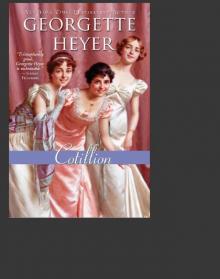 Cotillion
Cotillion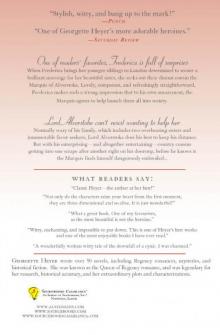 Frederica
Frederica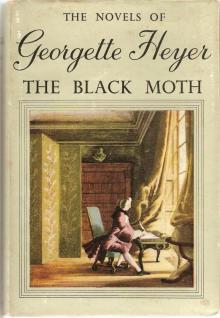 The Black Moth: A Romance of the XVIIIth Century
The Black Moth: A Romance of the XVIIIth Century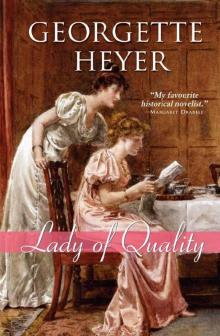 Lady of Quality
Lady of Quality Snowdrift and Other Stories
Snowdrift and Other Stories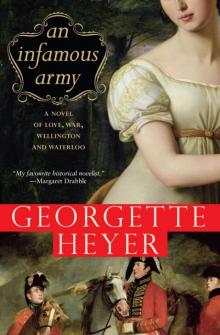 An Infamous Army
An Infamous Army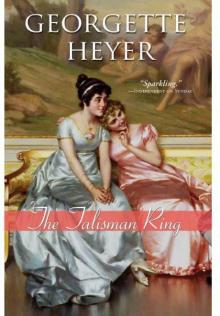 The Talisman Ring
The Talisman Ring Venetia
Venetia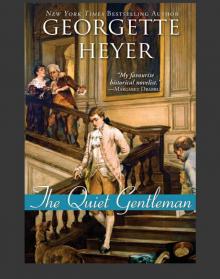 The Quiet Gentleman
The Quiet Gentleman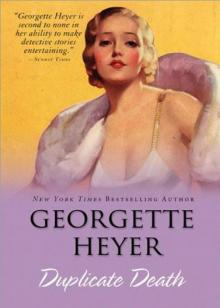 Duplicate Death
Duplicate Death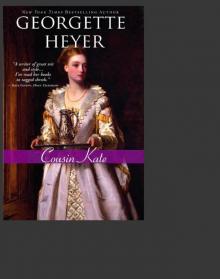 Cousin Kate
Cousin Kate Black Sheep
Black Sheep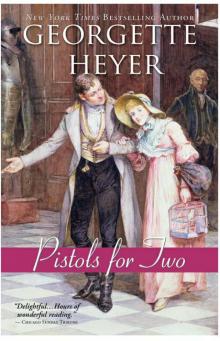 Pistols for Two
Pistols for Two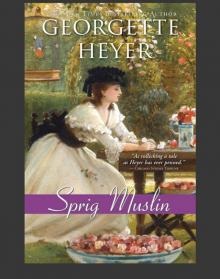 Sprig Muslin
Sprig Muslin No Wind of Blame
No Wind of Blame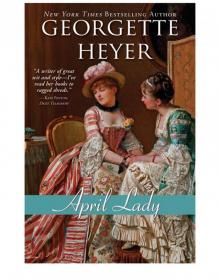 April Lady
April Lady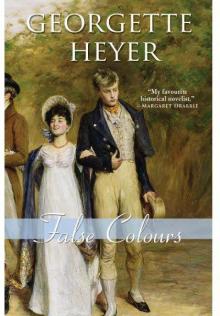 False Colours
False Colours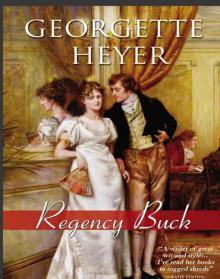 Regency Buck
Regency Buck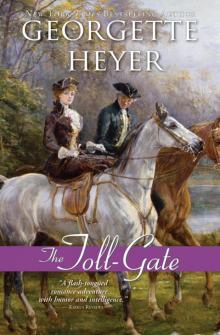 The Toll-Gate
The Toll-Gate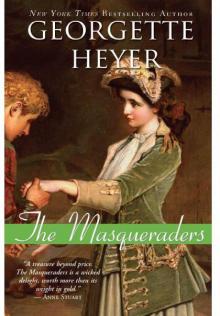 The Masqueraders
The Masqueraders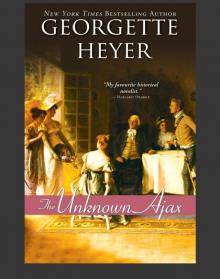 The Unknown Ajax
The Unknown Ajax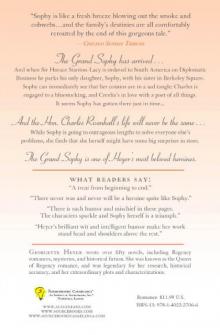 The Grand Sophy
The Grand Sophy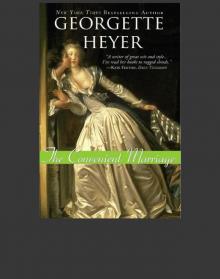 The Convenient Marriage
The Convenient Marriage Faro's Daughter
Faro's Daughter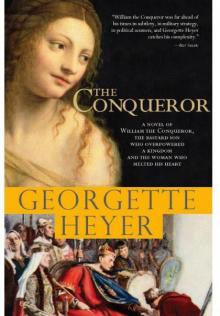 The Conqueror
The Conqueror The Foundling
The Foundling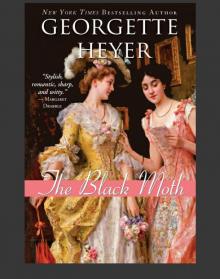 The Black Moth
The Black Moth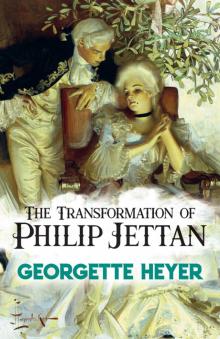 The Transformation of Philip Jettan
The Transformation of Philip Jettan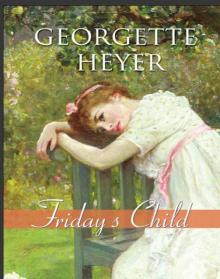 Friday's Child
Friday's Child Beauvallet
Beauvallet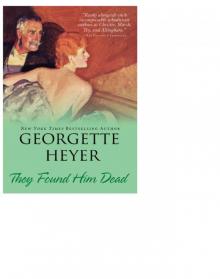 They Found Him Dead
They Found Him Dead Charity Girl
Charity Girl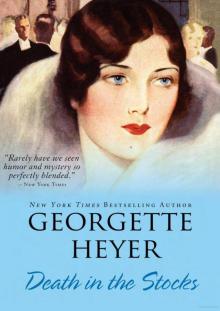 Death in the Stocks: Merely Murder
Death in the Stocks: Merely Murder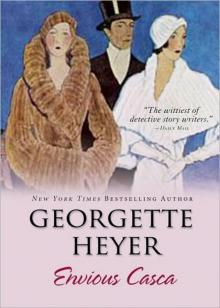 Envious Casca
Envious Casca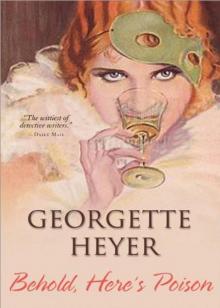 Behold, Here's Poison
Behold, Here's Poison Arabella
Arabella The Nonesuch
The Nonesuch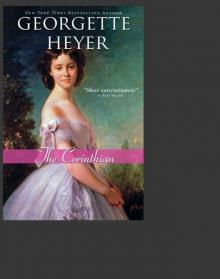 The Corinthian
The Corinthian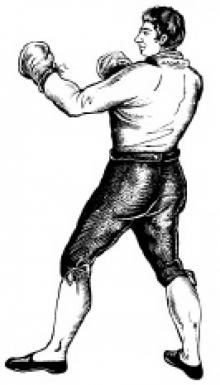 Jennifer Kloester
Jennifer Kloester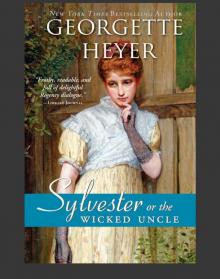 Sylvester
Sylvester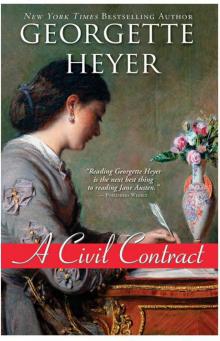 A Civil Contract
A Civil Contract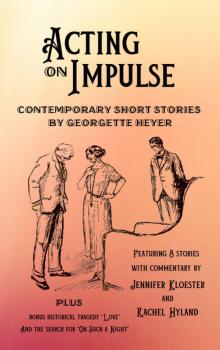 Acting on Impulse
Acting on Impulse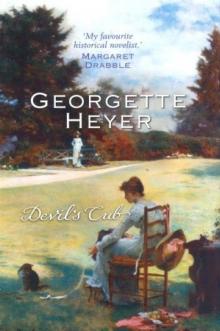 Devil’s Cub at-2
Devil’s Cub at-2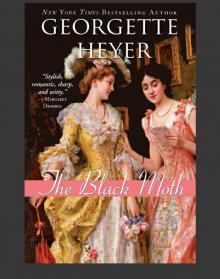 Black Moth
Black Moth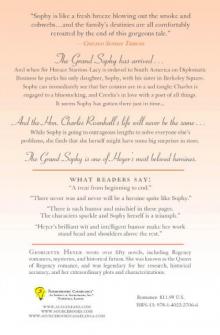 Grand Sophy
Grand Sophy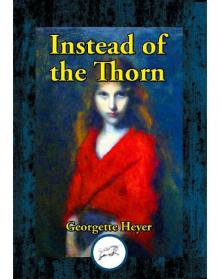 Instead of the Thorn
Instead of the Thorn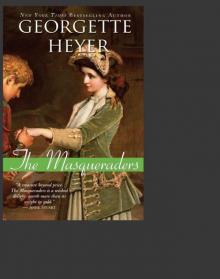 Masqueraders
Masqueraders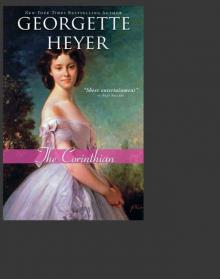 Corinthian
Corinthian Reluctant Widow
Reluctant Widow